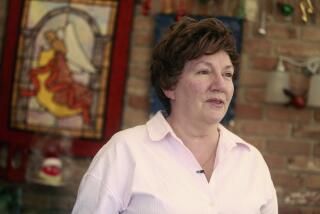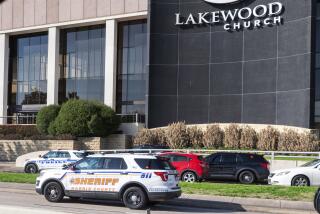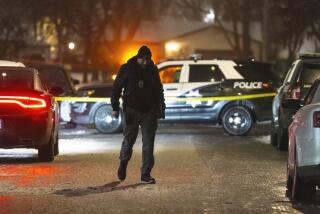Killing of Iraqi man in Dallas sparks concern over possible hate crime
Dallas police have determined that a rifle round was used to kill an Iraqi man while he was photographing a rare snowfall in the city with his wife, but it remains unclear if he was targeted because of his race or religion, authorities said Friday.
Ahmed Al-Jumaili, 36, was taking pictures of the snow with his wife and brother around 11:40 p.m. Wednesday when he was shot in the parking lot of an apartment complex, police said.
The victim yelled out “I’m hit,” and fled to his nearby apartment, but he died of his injuries less than an hour later, according to Dallas Police Maj. Jeff Cotner.
Al-Jumaili, who arrived in Texas from Iraq and reunited with his wife in the past month, had never seen snow before.
“Just like all of us, a pretty snowfall brings the child out in us,” Cotner said during a news conference Friday. “And you can just imagine the excitement between his wife, and his brother and himself.”
Police have determined that two to four men in their late teens or early 20s entered the Walnut Bend Apartment Complex on foot shortly before the shooting. They fired several rounds from a rifle, at least one of which struck Al-Jumaili.
Police have not ruled out the possibility that Al-Jumaili was targeted because he is Muslim, but investigators have yet to uncover evidence to support that claim either. On Friday, Cotner said the victim and his family did not have any interaction with the men who fired the rifle prior to the shooting.
“We don’t know. I can’t refute that and I cannot corroborate it,” Cotner said of concern that the shooting may have been a hate crime. “If they were a target? That’s a possibility.”
Cotner said it’s also possible that the men may have had an argument among themselves, and Al-Jumaili was an unintended target.
The attack has stirred fears among some Muslim activists, who pointed to the recent slayings of three Muslim students in North Carolina and recent protests in Garland, Texas, as evidence of heightened anti-Islamic sentiment.
“Because of recent incidents targeting American Muslims, including the murder of three young Muslims in North Carolina, we urge law enforcement authorities to address community concerns about a motive in this case,” Alia Salem, executive director of the Council on American-Islamic Relations’ Dallas-Fort Worth Chapter, said in a statement.
Deah Shaddy Barakat, his wife, Yusor Mohammad, and her sister, Razan Mohammad Abu-Salha, were all shot and killed in Chapel Hill, N.C., in February, though it is unclear if the triple homicide was caused by a dispute over parking tickets or their faith.
The suspect in the Chapel Hill case, Craig Hicks, has been described by neighbors as a menacing figure who often obsessed over parking regulation in the apartment complex where he and the victims lived. But a Facebook profile belonging to a Craig Hicks was also home to several anti-Muslim and anti-Christian comments and posts.
Al-Jumaili and his wife, Zahara, had married in Iraq 16 months ago, according to a fundraising page created for the victim’s family. Zahara left Iraq for Texas one year ago, and Al-Jumiali stayed behind until he could earn enough money to follow her.
Northern Dallas is home to a large community of Iraqi refugees, and the neighborhood where Al-Jumaili was shot has a large immigrant population, according to Wes Magruder, a senior pastor with Kessler Park United Methodist Church and a local activist concerned with Muslim-Christian relations.
“There are more and more Iraqis coming here to Texas. A lot has to do with the thriving job environment,” Magruder said in a telephone interview with the Los Angeles Times. “The weather is conducive to resettlement, and the cost-of-living is less than on either one of the coasts.”
Al-Jumaili and his wife had both obtained refugee settlement visas to leave Iraq, Magruder said.
Magruder said the recent protests in Garland have led many in the Dallas community to fear Al-Jumaili’s shooting was a hate crime, even if the police have not found evidence to support that claim.
At the Garland protests, hundreds of people began shouting anti-Islamic rancor at a group of Muslims who had gathered to raise funds to help educate people about Islam and combat anti-Muslim sentiments.
Salem, of the Council on American-Islamic Relations, told reporters on Friday that her group is raising reward money for any information that leads to an arrest in Al-Jumaili’s shooting, and that reward money will be coupled with the $5,000 being offered by the city’s CrimeStoppers program.
“This is a tragedy that has brought extreme heartache upon the family and extreme heartache upon the community,” Salem said Friday. “There is no shortage of sadness for the loss of this beautiful young man.”
Follow @JamesQueallyLAT for breaking news
More to Read
Start your day right
Sign up for Essential California for news, features and recommendations from the L.A. Times and beyond in your inbox six days a week.
You may occasionally receive promotional content from the Los Angeles Times.







